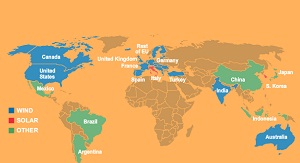U.S. falls behind China, Germany in clean energy investments
 Last week The Pew Charitable Trusts released a new study showing that the U.S. has indeed fallen behind both Germany and China in terms of clean energy investments in 2010. The news throws doubt on whether the U.S. can return to being the world’s largest market for renewables like solar, wind and geothermal.
Last week The Pew Charitable Trusts released a new study showing that the U.S. has indeed fallen behind both Germany and China in terms of clean energy investments in 2010. The news throws doubt on whether the U.S. can return to being the world’s largest market for renewables like solar, wind and geothermal.
In 2010, China attracted $54.4 billion in clean energy investments, an international record, and a 39 percent increase over 2009, according to the report, “Who’s Winning the Clean Energy Race?” The investments in China were equal to the global investment in 2004, the report found. Germany saw private investments in clean energy double in 2010 to $41.2 billion compared to 2009, raising it to second. While the U.S. saw its investments in clean energy grow by 51 percent to $34 billion in 2010.
“Despite an increase in investments, still we’ve fallen to third,” Phyllis Cuttion, Pew’s Director of its Clean Energy Program. She had just finished moderating a panel, “The new Great Game: Jobs, Wealth and the Race to Own Clean Energy”, at the Bloomberg New Energy Finance Conference in New York, N.Y. “The thing we worry about the most is not trailing China, but the precipitous fall we've seen in the U.S. We used to dominate the sectors in terms of investments [in the industry].”
China also jumped ahead of the U.S. in terms of overall installed clean energy in 2010. “In 2009 we were barely ahead of China,” she said.
Part of the reason China has led the U.S. for two years now is that it can make capital available at low-cost, according to Cuttion.
“It’s not just a matter of low-cost,” she said. Germany has a highly skilled workforce, but its domestic policy, which includes its feed-in tariff, led to the increased investments in the German market.
“Policy matters. Investors are all looking for the same thing: transparency, longevity, consistency,” Cuttion said. They want a signal market signal from the government that there will be support for the market. “A national policy is what’s going to be needed to give the investors TLC they need to invest in the U.S. They have said all the same things. As a company and an industry, we need some things. Do you have automatic grid connection [i.e., simplified connection standard]?”
“There’s Republican support for a clean energy standard,” Cuttion said, referring to Sen. Lindsey Graham of South Carolina. Asked if there’s the political will to get it passed, she responded; “If the Senate puts together the bill, and if it’s proposed in the House, if there’s pressure from the public and from business, I think we could get something done.”
The reasons for supporting clean energy are largely economic, Cuttion said.
“Our country would be economically better off,” she said. By moving to domestically produced clean energy we could reduce reliance on imports and spending billions a day on imported energy.
In the future, 90 percent of energy demand is going to come from the developing nations of the world, according to Cuttion, which could provide an important new market for the U.S.’s exports.
“Hopefully that’s a message that’s going to resonate across America and with legislators, with how to grow jobs. I think we need to look at this through an economic lens and then it will gain popularity,” she said.
While the U.S. has slipped behind in two important clean energy categories, it still remains number one in venture capital, which spurs new innovations.
“I think one of the things we’re thankful about is we’re viewed as an innovative capitol,” Cuttion said. But if the U.S. falls behind in manufacturing and installing, the innovations could move elsewhere.
“The last thing we want to do is find the next new thing; then German, Denmark, China, and other countries manufacture it and export it back to us,” Cuttion said.



